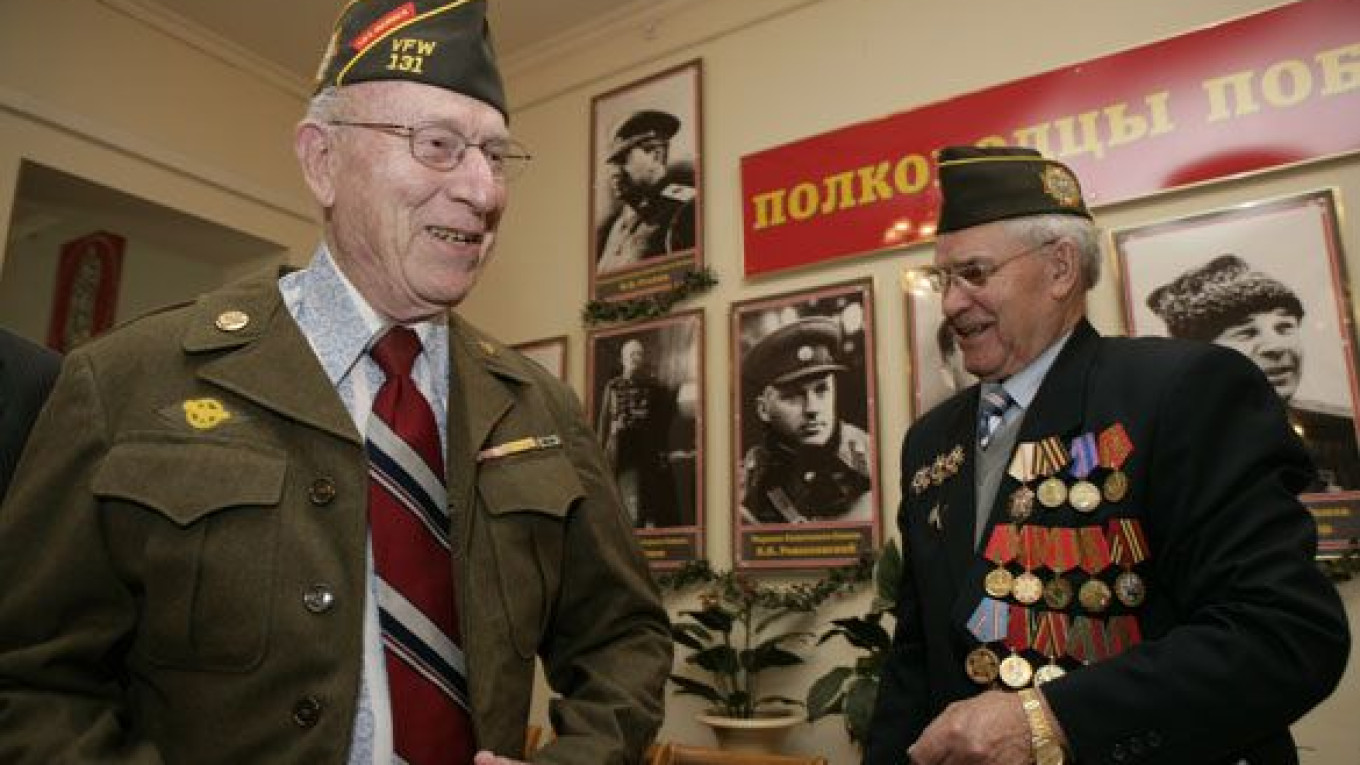The 93-year-old American and the 86-year-old Russian had never laid eyes on each other until Thursday afternoon. But they greeted each other like old friends.
U.S. Sergeant William Duane Bush came to Moscow to raise a vodka toast with Soviet Colonel Grigory Prokopyev to a historic day in 1945 when their countries' armies linked up on the Elbe River in Germany to crush Nazi forces.
"We knew that there should be a meeting but didn't know when and where," Prokopyev said, recalling the union on April 25, 1945.
In the last days of World War II, Nazi Germany was caught between the Soviet army, marching from the east, and the Western Allies, coming from the West. The two armies met on the Elbe, near Torgau, Germany, in an event that became a symbol of brotherhood-in-arms between the United States and the Soviet Union.
Bush and Prokopyev didn't meet personally on the Elbe River. But 65 years later at the Moscow office of the Russian Committee of Veterans, they repeated what the Soviet and American soldiers did back at the Elbe: They exchanged presents, drank vodka and established friendship.
"Signs were agreed for the two armies: The Americans were to shoot with green flares, and the Soviets with red ones. But the American troops didn't happen to have any green flares that day," Prokopyev said.
The U.S. troops had to make an improvised American flag by painting red stripes on a white sheet and waving it above a Torgau castle, Prokopyev said. The Soviet side responded with red flares.
"It was a very emotional meeting. We wondered who those American guys were, and they were interested in knowing who we were," Prokopyev said. "We communicated with gestures, smiles and hugs. There were no photographers, no journalists, no interpreters, but thankfully we were well-supplied with alcohol."
Prokopyev recalled that the soldiers met on the bank of the river, where they spread their mantles and drank together.
The first toast was for victory —? which came two weeks later — and the second was for the leaders: Josef Stalin and Harry Truman. "The Americans were good at drinking vodka. … We couldn't understand each other, but we were having fun," Prokopyev said.
At the end of the historic meeting, the troops exchanged ruble and dollar bank notes with their addresses scribbled on them, he said.
Bush, a native of Nebraska, said he wanted to drink vodka with the Russians again, this time at the office of the Russian Committee of Veterans. Like 65 years ago, he and Prokopyev raised their first toast to victory.
"I think it's great that you people remember the veterans. In our country, we are almost forgotten," Bush said.
Prokopyev, who attended a reunion of the troops on the Elbe in April, said only one American veteran had shown up this year.
"Most of the U.S. troops are too old to travel, most of them are over 90," said Nathan Hunt, a great-nephew of Bush who helped arrange his great-uncle's trip to Moscow.
"The Committee of Veterans was interested in arranging such a meeting because it might be the last-ever meeting of the American and Russian soldiers who were at the Elbe River," said Hunt, who chairs the national board of the Canada Eurasia Russia Business Association.
Bush, a sergeant in the 134 Regiment of the 35th Division, said he wore his uniform Thursday for the first time since the 1970s.
"This is my first visit to Russia and for the first time abroad since 1945," said Bush, who was accompanied by his family. "And I'm very glad to be here."
The two veterans were welcomed by Soviet Air Force Marshal Alexander Yefimov, 87, who presented them with special medals.
"It was a general victory, a mutual victory," Yefimov said of the end of World War II. "I think it was a war of our politicians. We soldiers had been friends, and we remained friends."
A Message from The Moscow Times:
Dear readers,
We are facing unprecedented challenges. Russia's Prosecutor General's Office has designated The Moscow Times as an "undesirable" organization, criminalizing our work and putting our staff at risk of prosecution. This follows our earlier unjust labeling as a "foreign agent."
These actions are direct attempts to silence independent journalism in Russia. The authorities claim our work "discredits the decisions of the Russian leadership." We see things differently: we strive to provide accurate, unbiased reporting on Russia.
We, the journalists of The Moscow Times, refuse to be silenced. But to continue our work, we need your help.
Your support, no matter how small, makes a world of difference. If you can, please support us monthly starting from just $2. It's quick to set up, and every contribution makes a significant impact.
By supporting The Moscow Times, you're defending open, independent journalism in the face of repression. Thank you for standing with us.
Remind me later.


